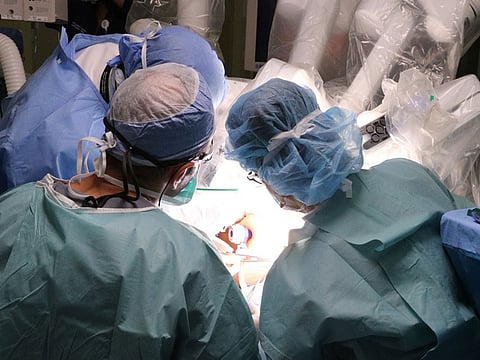Patient, 78, recovers after pioneering two-kidney transplant in UAE
Procedure involved simultaneous transplantation of both organs from single deceased donor

Abu Dhabi: Cleveland Clinic Abu Dhabi has performed a pioneering robotic bilateral kidney transplant in the UAE from a deceased donor.
The transplant involved the simultaneous transplantation of two kidneys from a single deceased donor into a 78-year-old Emirati patient suffering from end-stage renal disease. The patient had been on hemodialysis for three years before the surgery.
Unlike traditional kidney transplants, which typically involve only one kidney, a bilateral approach was necessary in this case because each donor kidney alone did not provide sufficient function to meet the patient’s health needs.
By transplanting both kidneys, physicians optimised the patient’s renal function, which is critical for recovery and long-term health. This approach is particularly beneficial when donor kidneys are smaller or have reduced individual function, which can sometimes occur with organs from deceased donors.
Dr Georges-Pascal Haber, CEO of Cleveland Clinic Abu Dhabi, said: “This procedure is a milestone not only for Cleveland Clinic Abu Dhabi but for the entire region.”
Robotic-assisted technology in this complex procedure offers numerous benefits, including a less invasive approach, shorter recovery time, and better long-term outcomes.
The patient, who faced multiple complications during dialysis, is now recovering well following the surgery.
The patient, who also managed secondary diabetes mellitus alongside renal disease, was considered high-risk for traditional open surgery. The robotic bilateral kidney transplant minimised the potential risks associated with more invasive procedures. Within days of the surgery, the patient was discharged from the hospital, much sooner than would have been possible with a conventional transplant.
Sign up for the Daily Briefing
Get the latest news and updates straight to your inbox


